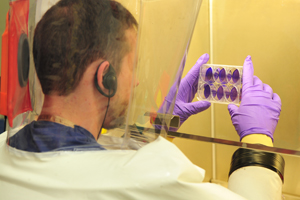Tour: Infectious diseases, genomics and animal science at Texas Biomed
- Time:
- Sunday, October 30th, 3:30 pm to 5:30 pm
- Location:
- Texas Biomedical Research Institute and Southwest National Primate Research Center
 Texas Biomedical Research Institute is one of the world's leading independent biomedical research institutions dedicated to advancing health worldwide through innovative biomedical research. Texas Biomed partners with hundreds of researchers and institutions around the world to develop vaccines and therapeutics against viral pathogens causing AIDS, hepatitis, hemorrhagic fevers and parasitic diseases responsible for malaria and schistosomiasis. The Institute also has programs in the genomics of cardiovascular disease, diabetes, obesity and other diseases, as well as regenerative medicine programs in neurodegenerative disorders, muscle diseases and diseases of the eye.
Texas Biomedical Research Institute is one of the world's leading independent biomedical research institutions dedicated to advancing health worldwide through innovative biomedical research. Texas Biomed partners with hundreds of researchers and institutions around the world to develop vaccines and therapeutics against viral pathogens causing AIDS, hepatitis, hemorrhagic fevers and parasitic diseases responsible for malaria and schistosomiasis. The Institute also has programs in the genomics of cardiovascular disease, diabetes, obesity and other diseases, as well as regenerative medicine programs in neurodegenerative disorders, muscle diseases and diseases of the eye.
Texas Biomed is the only independent research institute in the country with a biosafety level 4 laboratory, a national primate research center and a genomics research center on one campus. Join us to learn more about these resources and the unique projects we have happening.
BSL-4 Laboratory
Developing vaccines and therapies to successfully treat some of the world’s deadliest diseases for which there are no known treatments or vaccines requires the safest laboratory in the world in which to study them. Texas Biomed is home to one of only six such labs in North America and the only operational BSL-4 lab owned by a private institution. Designed for maximum containment, BSL-4 labs offer a safe setting for scientists and the surrounding environment. The tour will feature a stop at the suit room and a virtual tour inside the lab.
Southwest National Primate Research Center
Our extraordinary primate resources and distinguished history in the humane and appropriate use of animals in research has led to a renewal just this year of SNPRC's funding as one only seven National Institutes of Health National Primate Research Centers. Because of their close similarity to humans in genetics and physiology, nonhuman primates fill a unique and critical role in efforts to understand human health and disease. By studying these animals in a controlled environment, scientists can develop a better understanding of the biological processes that underlie and contribute to disease. NOTE: Photography and videography is not allowed in the primate area.
Genomics Research Center
Texas Biomed is home to the combined expertise of protein science, metabolic science, genetics and complex data integration and analysis with current high throughput instrumentation. Guests will tour the Genomics Computing Center and learn more about new projects to combat complex diseases.




